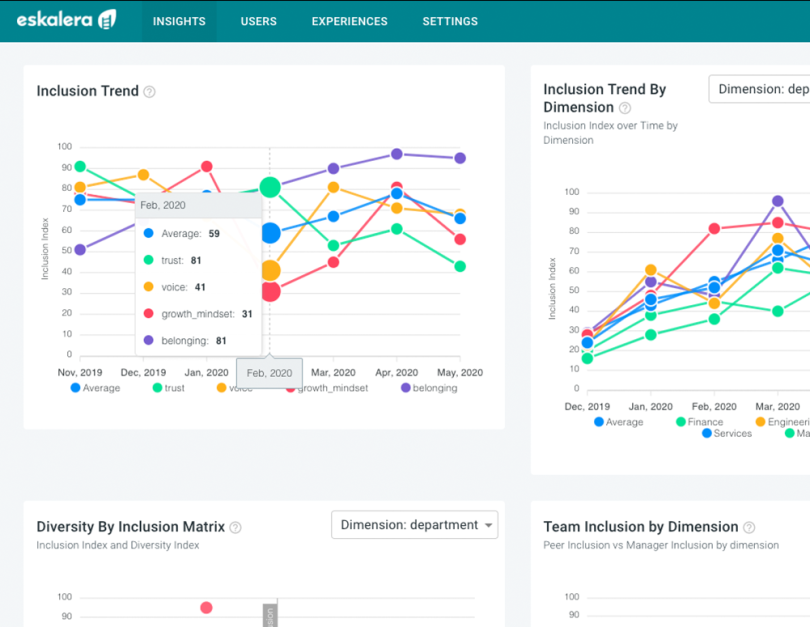
San Francisco-based HR platform Eskalera announced the launch of newly developed technology aimed at helping businesses improve their diversity and inclusion efforts on Thursday.
The company’s Inclusion Index provides clients with real-time data analytics intended to improve professional approaches to diversity training. Eskalera’s platform offers businesses and their employees learning solutions and actionable steps that can be made in order to improve company culture. This information is applicable on a micro-scale within individual relations and teams, as well as a macro-scale, company-wide.
Data for the inclusion index is gathered through a series of 10-minute micro-trainings for employees. As opposed to providing employees with a day-long session of diversity training, Eskalera’s training sessions are spread out over the course of a month, a choice that, according to the company, increases learning retention rates. The work doesn’t stop there. Companies can employ Eskalera’s service over an extended period of time to help business leaders further drive their own sense of accountability.
“If you think about that, this is a totally different, and I would argue more insightful, way to think about diversity,” Dane Holmes, CEO of Eskalera, said in an interview with Built In.
A series of self-reflective exercises are spread throughout the training sessions, Eskalera then collects data from the exercises and uses that information to provide tangible, personalized, action-driven solutions for companies looking to improve their diversity and inclusion efforts. Answers to the exercises are completely anonymous in order to create a “blame-free” zone that encourages employees to have what are oftentimes considered to be “tough” conversations in the workplace.

“What we’re always trying to do is, not only tell you what the issue is, but help you solve it, and often the way to help you solve it is through learning and action,” Holmes said.
Companies interested in the HR data analytics program can sign up for three months of programming, completely free.
“We deeply believe, and the research would support, that an inclusive culture is the equivalent of a high performance culture, and so if you create an inclusive environment, then you create a high performance environment,” Holmes continued.
Although some critics may say that their companies are already performing at their highest level, Holmes argues that an inclusive culture is key to keeping that level of high performance sustainable. For Holmes, diversity means more than representation; meaningful change, he argues, comes from action.
“Diversity has often been viewed through the lens of representation, and I think, as you can imagine, representation doesn't equate to inclusion. They’re two very fundamentally different things, and so it’s a poor measure,” Holmes said.
Eskalera’s micro-sessions intend to address and encourage conflict resolution, leadership development and emotional intelligence. The platform collects data on an array of identity variables, including race, skin tone, gender and sexual orientation, among many others.
Dr. Tolanda Tolbert, the company’s co-founder and head of strategy and culture, has worked in the diversity and inclusion field for over 20 years. Tolbert agrees with Holmes that diversity efforts need to include actionable steps in order to be effective.
“The commitment, right, it cannot be window dressing. It cannot be one and done. It must be something that an organization is long term committed to and is very intentional about,” Tolbert said in an interview with Built In.
Tolbert continued to explain that diversity and inclusion efforts must also be addressed in a holistic manner in order for change to be effective and long-lasting.
“It needs to be integrated into all of your HR systems. It cannot be this standalone thing. It cannot be the thing that HR does. It needs to be the thing that [your] company does because [you] believe in [it],” Tolbert said. “This has been a space where people like to, you know, talk the talk, but not walk the walk. We’re trying to make sure that both people at the leadership level and the individual level have the tools to walk the walk.”
Moving forward, Tolbert is focused on making an impact; she’s hopeful that Eskalera’s platform can drive change in a positive direction. “I want to make sure that everybody who wants to do the work and wants to change has the tools to do so, so that we can make the larger societal changes that we need to,” Tolbert said.



